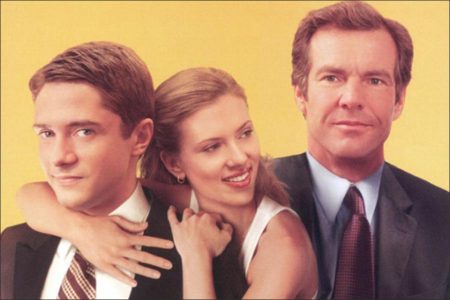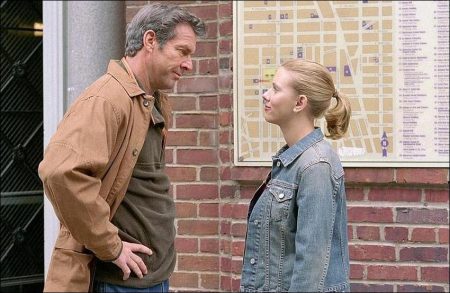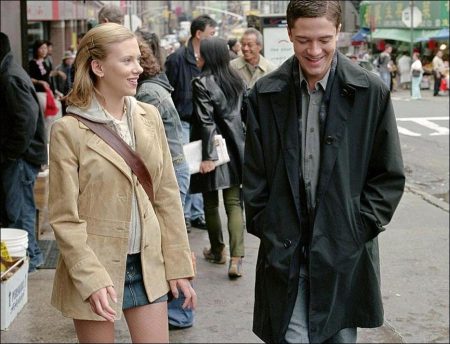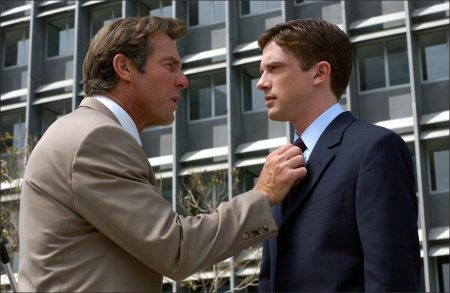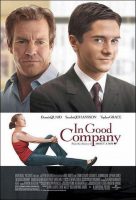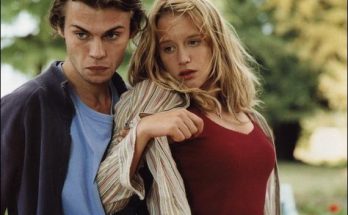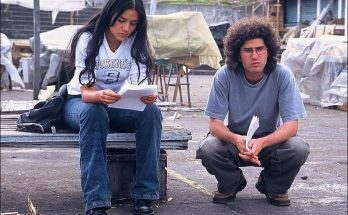The Synergy Behind In Good Company
In Good Company Movie Trailer. Director Paul Weitz is admittedly drawn to material that examines life’s surprises, ironies and coincidences, which he, along with his brother and collaborator, Chris Weitz, successfully explored with their Academy Award-nominated screen adaptation of Nick Hornby’s About a Boy (which they also co-directed).
Intrigued by the non-traditional father/son relationship, illustrated in the dramawith- comedy About a Boy and earlier in the comedy-with-heart American Pie (his directorial debut with Chris), Weitz, who wrote the original script for In Good Company, returns to that premise… but with a different, albeit compelling, set of circumstances.
The ever-changing economic landscape of corporate mergers, failing dot-coms and global conglomerates that has dominated the news over the past several years proved to be the perfect chaotic world in which to set his screenplay.
Says Paul Weitz, “In approaching In Good Company, I really wanted to attempt a film in the vein of Billy Wilder, which in some ways About a Boy had been. About a Boy was such an English film, though, and I now wanted to approach particularly American myths and look at, to some extent, how economic trends affect individual lives. Wilder was able to balance cynicism and optimism, particularly with films like The Apartment—he really captured the collision of the American dream and our tendency towards career ambition and how that balances with being a human. And that’s something that’s still very much present in our landscape today.”
After almost six months of refining and researching his initial idea for the screenplay and conferring with his brother Chris (who serves as a producer on the film), Paul had fashioned a very human story of the unlikely relationship between two men who find their satisfying, status quo existences disrupted by the startling truth that they no longer have any control over both the professional and personal sides of their lives.
In the process, Weitz had artfully tapped into the emotional and economic zeitgeist that resounded with a multitude of people—the prevailing sentiment that, in this new world order of huge multinational corporations, nearly everyone has a story of a family member or friend who has been displaced, downsized or affected in some capacity…looking at a now commonplace national occurrence, the filmmaker had found a human story.
Weitz notes: “People related stories to me about relatives and friends, in mid-life, being fired or falling victim to corporate downsizing. And now these 50-somethings were looking for a job at a time when they had hoped to be hitting their stride, with plenty of work years left, or re-training to try to enter the workforce in a different line of work. All of that fed my idea about a 51-year-old suddenly finding himself, because of a takeover, the employee of a guy half his age and having to deal with the humiliation of that situation.”
But in typical Weitz fashion, the exploration of what could be a bleak turn in a character’s life—treading prudently in new corporate terrain in hopes of keeping his job—is handled with gentle and character-driven humor. “Much like in Chekov, I find that anything that’s at all serious, the way people usually deal with challenges in life is to laugh about them…if they’re healthy at all. I don’t find a separation between ‘drama’ and ‘comedy,’ it’s really a question of the modulation of the comedy.”
For Chris Weitz, he found his usual working dynamic with his brother altered for this film. Chris Weitz: “Paul was really intent on telling this story, set in a world of downsizing and synergy as larger corporations take over smaller ones and control of people’s lives. My first role was as his sounding board for ideas and sort of encourage him during the writing process. Actually being less involved on this project has been a bit of a blessing for me—the stress has been much lower! I’ve gotten to let a lot more of the day-to-day decisions go to Paul.”
The role of Dan Foreman is one that is tailor-made for Dennis Quaid, who inherently brings a confident, straightforward presence, coupled with a subtle emotional depth to each role he plays. He was the first actor cast in the film and admittedly the anchor for the project’s core relationship.
Weitz on Quaid: “I think it’s really cool that Dennis—who’s still doing action movies and very much a leading man—was willing to take on the role of Dan. Some actors would think it would make them less viable. But what I think really works is that here is a character who is in danger of being sidelined who is still relatively young and incredibly vital. It’s more interesting to see that kind of man being pushed aside. I’m lucky Dennis was willing to play one year older than he really is—every day, we had to assiduously put gray in his hair. I should have just given him some of mine.”
Casting the youthful looking and athletic Quaid in the role of a paunchy 51-yearold businessman with salt and pepper hair took some imagination. But with help from his hair stylist administering daily applications of gray hair color and costume designer Molly Maginnis (As Good As it Gets) utilizing creative wardrobe styling, he was aged up to personify his middle-aged character. “This character is not so much older than myself, so I take solace in the fact that they had to age me up to play him,” says Quaid with a laugh. “I’m just glad I’m old enough to play him. I love the part.”
For Quaid, the appeal of the project lay with Weitz and his smartly written, relatable, multi-dimensional script. He remarks, “Paul is one of the most talented directors out there…not too many people can do comedy like this…it’s very human and intimate. I worked with Mike Nichols about 15 years ago [on Postcard From the Edge, opposite Meryl Streep] and he reminds me of Mike.
“What’s also great,” continues Quaid, “is that Paul really fosters a collaborative process on the set. Some writer/directors are really sticklers about their words, but for Paul, it’s really about the process of discovery, even for himself.”
Weitz adds, “Dennis has been doing this for such a long time that he is a natural film actor and extremely subtle. Sometimes I knew what he was doing was working in the scene, but I’m never closer than 10 feet away when shooting, so I couldn’t tell exactly what he was doing in extreme close-ups. It was only after I was sitting in the editing room that I saw all of the little things that he was doing. He’s one of these actors who make things look as effortless as possible, and I think a lot of those actors are overlooked, because their strength is not calling out that they’re giving this great performance. They’re actually making tons of decisions that are making the character real.”
Both Topher Grace and Scarlett Johansson are in agreement with Quaid when it comes to the writer/director, who often was just as collaborative with them when it came to improvising or re-working their dialogue.
Notes Grace, “I’m somewhat new to the game, but I believe the whole point of it is to work with great directors. It’s such a director’s medium. I’ve never worked with a writer/director who had written something that wasn’t adapted and it’s been a total plus. Paul is so open, yet has such a specific idea of what he wants. He is a fascinating guy to be around.”
Says Johansson, “Paul is one of the most inspiring directors I’ve ever worked with; he’s so excited about improv and getting new ideas. It’s definitely been to our benefit as actors and his script, it’s a perfect little gem, all the characters are so incredibly developed. No matter what story he’s telling, it’s very real.”
Topher Grace is probably best known for his starring role in the hit comedy series That ‘70s Show, but it was his first film role in Steven Soderbergh’s Oscar-nominated film Traffic that resonated with the filmmakers when envisioning an actor to portray Carter Duryea. Grace’s ability to imbue that character with an edgy intelligence coupled with impeccable comedic timing made for an easy casting decision for Weitz’s ambitious young MBA, whose personal life begins to fall apart as he is granted the promotion of his dreams.
Says the director, “Topher has such a great energy, which is very different from Dennis’, which made for a great contrast in the central relationship. I actually did something after their very first rehearsal, which in retrospect could have been disastrous. We read through a scene and then I said to Topher, ‘Okay, I’d like you to give some notes to Dennis.’ And Topher said, ‘Are you kidding me?’ ‘No, I’m serious.’ I was thinking at the time that since the script calls for the younger guy to order the older guy around, I thought it would be interesting to see what would happen there and about the actors’ dynamics.
“What I ended up learning first and foremost about Topher is that he’s very smart. He said, ‘Well, I’m not going to do that.’ And they both sort of laughed about it. But Topher made the absolute right decision. Both actors were smart enough to help me avoid a bad start as their director.”
“He reminds us most of a young Jack Lemmon,” adds Chris Weitz, “in terms of the boyish enthusiasm that he can bring to even the most cynical of characters. He was one of our easiest casting assignments.”
“I think when somebody gives a really good performance, one tends to think that they’re exactly like their character. Neither Dennis nor Topher is particularly like the character they’re playing and yet they both inhabit these guys fully, which I think speaks highly of their acting ability. And they’re just great together,” comments Paul.
Grace, who filmed In Good Company while on hiatus from his popular television series, is emerging as a talented film actor with diverse roles in such divergent projects as as Win a Date With Tad Hamilton and P.S., opposite Laura Linney. Grace treats each new film role as an ongoing tutorial and was enthusiastic about working so closely with Quaid: “To be able to work every day for three months with someone as accomplished as Dennis…it’s the best graduate school ever. I observe him a lot, and he doesn’t talk down to me nearly as much as he should,” Grace says with a laugh, “which is nice.”
Quaid was equally impressed with his young co-star’s ability to deliver when faced with some of Weitz’s emotionally complex and lengthy dialogue. “Topher is very talented—I’m amazed by actors who come out of situational comedy. He knows how to make dialogue work. He sucks it in, throws it out and makes it work. He has nailed some pretty substantial scenes with a lot of difficult dialogue with precision.”
The role of Alex, Dan and Ann’s eldest daughter, who strikes out on her own and subsequently engages in a secret liaison with her dad’s young boss, immediately garnered Johansson’s attention. At 19 years of age, she saw similarities between herself and the character and felt that, following more than a year of working on back-to-back dramas, a comedy—particularly one with which she had such an affinity—would be the perfect follow-up project.
“Alex resonated with me,” remarks Johansson. “We’re the same age and a lot of what she’s going through—moving out and trying to figure out what she really wants to do—is something that I went through not too long ago. It’s a good fit.”
To the filmmaker’s luck, they signed the young actress prior to what they refer to as “Scarlett Fever,” the release and subsequent onslaught of critical acclaim and accolades she received for her performances in Lost in Translation and Girl With a Pearl Earring.
“We’re very inquisitive when it comes to casting,” says Chris Weitz. “We see who we want and really go after it intently. It’s kind of like we’re building a baseball team. We go after our free agents and Scarlett, for instance, was a key acquisition. She’s extraordinarily natural and brings a voracity to everything that she does, which is why she’s gotten so much acclaim.”
Quaid, a veteran actor who has seen firsthand the glare of the media spotlight, states in his own forthright manner, “Scarlett is an incredible actress. You can be the darling of the media but if you haven’t got the goods, you haven’t got the goods—but she’s definitely got the goods.”
“I was lucky to cast Scarlett in that she makes the character incredibly real,” notes the director. “I like the idea of portraying a relationship in which the conflicts were coming not from dysfunction, but from both the father and the daughter being truly functional and having genuine love for each other. They are in the process of redefining their relationship, with Alex moving away from being her dad’s best buddy to this independent and adult woman.”
A further testament to the caliber of Weitz’s script and reputation as a talented director is the stellar roster of actors the filmmakers assembled for supporting roles: Marg Helgenberger, cast as Ann, Dan’s pregnant wife (who simultaneously filmed her role while taping her top-rated television series, CSI); David Paymer (Get Shorty) as lessthan- optimistic Sports America ad salesman Morty; Philip Baker Hall (Bruce Almighty) as sports equipment company owner Eugene Kalb; Clark Gregg (The Human Stain) as driven Globecom management team member Steckle; Selma Blair (Hellboy) as Carter’s short-term wife, Kimberly; and Malcolm McDowell (A Clockwork Orange) as the enigmatic and charismatic chairman of Globecom, Teddy K.
Helgenberger’s affection for the script, the cast and the filmmakers is evident when she says, “It’s such a wonderfully calibrated script, with the juxtaposition of Dan’s work life and his family life. Paul’s script is warm and funny and observant, and he’s come up with a really timely American story to tell. But he doesn’t hit you over the head with the age issues—he really comes at it from a comedic perspective, which is a much more subtle way to approach the themes in the story. Dennis is such a pro and the rest of the cast are just marvelous to work with. It’s projects like this that really attract me to working in film. There is so much heart and soul in this.”
* * *
Principal photography commenced in mid-March, filming in and around the Los Angeles, including: suburban Pasadena, filming interiors and exteriors of the Foreman home; and Downtown Los Angeles, which provided not only the urban backdrop for several scenes, but also the sound stages, which housed the impressive 6,000-square-foot sets that comprised the various work areas within the Sports America high-rise offices.
Production designer William Arnold and his art department spent close to three months designing, constructing and dressing the modern glass accented Sports America set, which is elevated six feet above the ground allowing an expansive view of the New York skyline (courtesy of a 25’ high, 211’ long trans light, ostensibly an enlarged color transparency) surrounding portions of the set. Specifically challenging to Arnold was having to create a practical way to transform the existing set into two additional and differing Sport America offices, as the company falls victim to the takeover and the subsequent shifts in personnel affect the workspace—which was accomplished by utilizing a second trans light with an alternate city view and by reconfiguring walls and re-dressing the cavernous sets, courtesy of set decorator, David Smith.
Once filming began, it was Chris Weitz who found himself in unfamiliar territory as he watched his brother take on the sole directing duties. “I get a lot less respect on set now,” he quips, “I feel like the trophy wife who’s hanging around and people feel they have to talk to.”
But Chris, who is set to make his own solo directorial debut with the upcoming His Dark Materials: The Golden Compass, is quite serious when speaking of his brother and his strengths as a director: “Paul is fantastic when it comes to working with actors. He comes from a theater background and really has a deep understanding and love for what an actor does when he or she goes about performing a scene.”
Executive producer Andrew Miano echoes that sentiment, adding, “One of the things that actors respond to is the chance to take on a part that both challenges them and allows them to change it up a bit… I believe that’s what attracts actors to Paul. He is very good at giving them an opportunity to shine.”
Weitz, however, has not forsaken his theater roots. He recently returned to the New York stage, writing the dark comedy Roulette, which premiered in February 2004 (while he was in pre-production on the film) at the prestigious Ensemble Studio Theatre, where he has been a member since 1993. He has written and directed numerous theatrical productions including Mango Tea and All for One, which starred Calista Flockhart and Liev Schreiber. His latest play, Privilege, will be produced by the Second Stage Theater this spring.
Part of the challenge for three of Weitz’s stars lay in the physical (i.e. athletic) demands called for in the script. To prepare for her role as a talented sportswoman, Johansson began training with tennis pro/consultant Nels Van Patten beginning in January 2004 and, to her credit, kept up with her weekly lessons during the grueling schedule of awards shows, events and premieres surrounding the blitz around the releases of both Lost in Translation and Girl With a Pearl Earring.
“I’m a New York City girl and I’ve never held a tennis racquet in my life. But that’s one of the perks of this profession, you get opportunities to learn new things and Nels has made me so enthusiastic about the sport.”
Quaid and Grace also had to prepare for their share of athletic challenges, particularly with the film’s key basketball scene, where the ad sales team takes on management in a “friendly” game—with management being so friendly they recruit from other departments, like shipping and receiving.
Quaid, who has previously starred in several sports driven films, acknowledged that basketball is not his strong suit. Grace also admits to struggling a bit with the scenes as well: “I’m not a very good basketball player… it was definitely a lot of takes until we’d sink a shot. But the good news is Dennis is worse than I am so I didn’t feel to bad,” he adds with a grin.
Cast and crew spent eight weeks filming in Los Angeles before relocating to New York City for a week, to capture the unique exteriors of Manhattan’s Madison Square Garden, Washington Square Park, Chinatown, TriBeCa and NYU.
As the end of filming neared, it is safe to say—starting from Weitz’s early musings on his screenplay and ending with the last shot filmed on location at New York’s Madison Square Garden—that the hard work of 35 different departments comprised of several hundred people on both coasts truly embodied the all-encompassing philosophies mantra-ed by the Globecom employees in the screenplay. As Teddy K might say, “Nice display of synergy.”
In Good Company (2004)
Directed by: Paul Weitz
Starring: Dennis Quaid, Topher Grace, Scarlett Johansson, Marg Helgenberger, David Paymer, Philip Baker Hall, Selma Blair, Ty Burrell, Frankie Faison, Lauren Tom, Amy Aquino
Screenplay by: Paul Weitz
Production Design by: William Arnold
Cinematography by: Remi Adefarasin
Film Editing by: Myron I. Kerstein
Costume Design by: Molly Maginnis
Set Decoration by: David Smith
Art Direction by: Sue Chan
Music by: Stephen Trask
MPAA Rating: PG-13 for some sexual content and drug references.
Distributed by: Universal Pictures
Release Date: December 29, 2004
Views: 150
